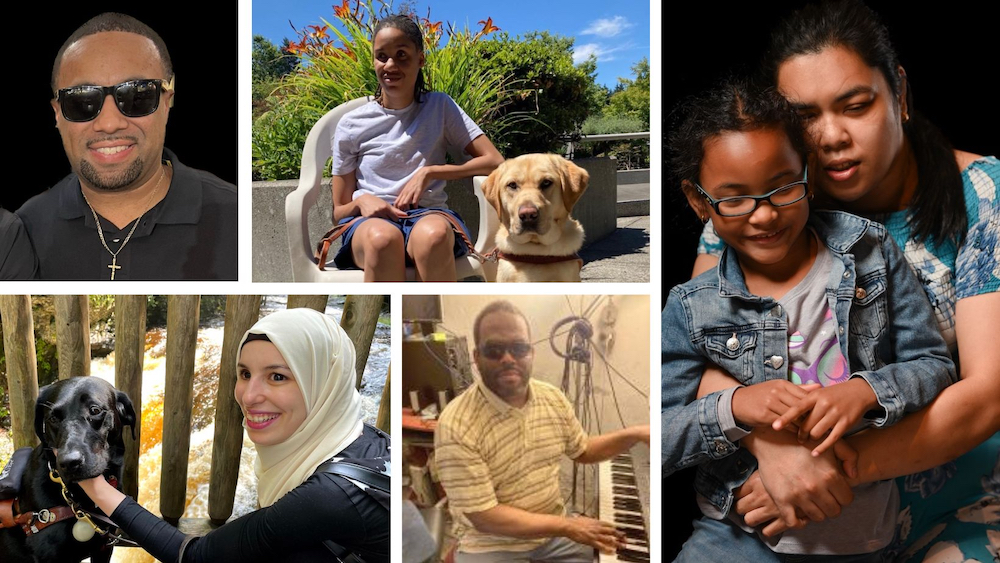By the time she arrived here in 2012, she had already undergone two surgeries and several additional procedures under full anesthesia to treat her condition of congenital glaucoma. By the time she was diagnosed at age 2, she had already lost considerable vision.
Now 25, married and a new mother, Hadjeb-Rahman has more than one answer for what it means to thrive: “If the definition is not based on environment but you as an individual making the most of it, then yes, I am thriving,” she said.
What does it mean to thrive for visually impaired individuals in Philadelphia?
Over the course of a year, Technical.ly is following 10 different persona groups and sharing their perspectives on their economic opportunities and obstacles in an initiative called Thriving. The project includes an audio series, reporting and focus groups. The visually impaired community is one of the persona groups identified for the series.
A recent census survey showed there were more than 61,000 Philadelphians who have some form of vision difficulty. A Technical.ly analysis of five-year IPUMS census data also shows around 152,500 disabled adults in Philadelphia for 2016-2020.
The people we talked to identified some unique challenges they face — chiefly, barriers to services and technology that can help them access aspects of everyday life that are normal to others. But we also heard stories of resilience in overcoming those obstacles, often with the help of their communities.
Here, five Philadelphians reflect on thriving through vision loss.
Katia Hadjeb-Rahman: ‘They didn’t define me by my blindness’
Hadjeb-Rahman would later have several more surgeries here in the United States including the removal of her right eye in 2019. She wears a prosthetic in that eye and has minimal vision in her left eye.
In her small village in Algeria, Hadjeb-Rahman attended mainstream elementary school and credits her parents for filling in the gaps and working with her at home.
“They didn’t put any limits on me and didn’t define me by my blindness,” she said. “I knew people who didn’t send their kids to school because they had a disability. My parents didn’t do that and I’m so thankful.”
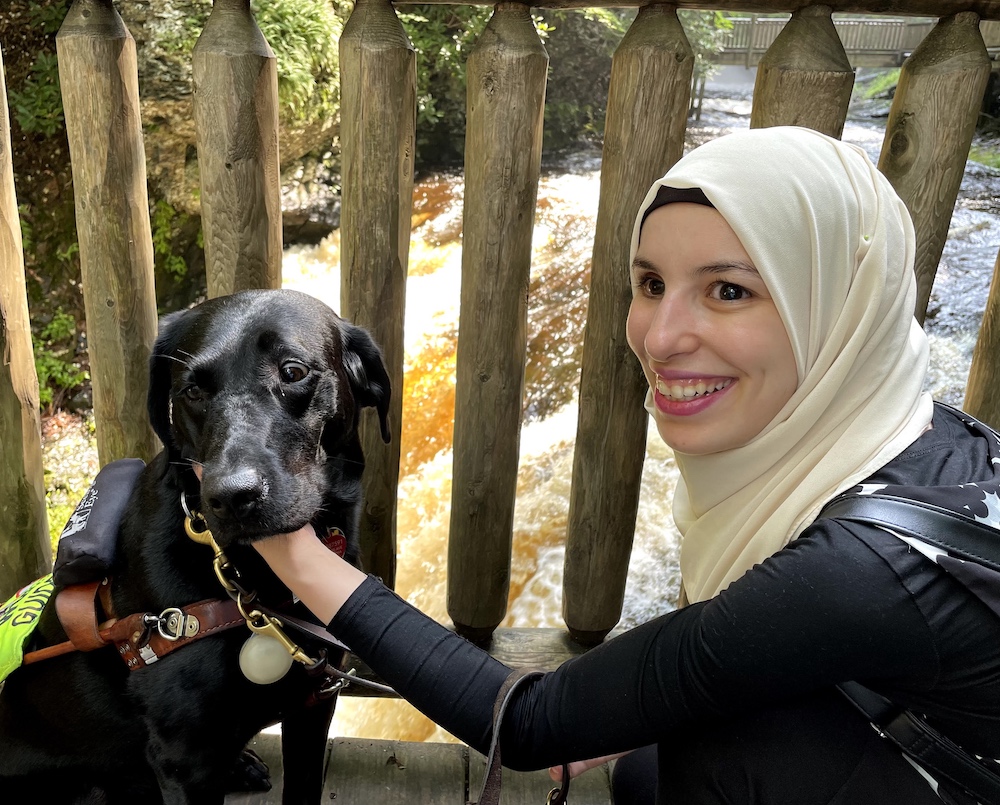
A few years before immigrating, the family enrolled Hadjeb-Rahman in a school for the blind where she learned braille. But when she started ninth grade at Fairmount’s Science Leadership Academy, she could not see the board and did not know the language. And although she said her English training was rather unstructured, she thrived in overcoming that obstacle and went on to receive her bachelor of arts in political science, international relations, and French from Widener University in 2021.
Hadjeb-Rahman believes environment is also an important factor determining thriving. When she entered a research program with the National Science Foundation, Hadjeb-Rahman fought through discouragement as many of the program’s components were not accessible.
“I had to rely on someone else to help and that’s not independence,” she said. “So, it’s not because you can’t because of any intellectual ability, or you don’t want to, it’s because society cannot accommodate you.” Although she successfully completed the program, having accessible materials is a dealbreaker for someone visually impaired: “I have thrived on my own in some ways and not in others.”
Ayanna Dickerson: ‘We need access to the workforce’
Ayanna Dickerson, 28, has a somewhat dimmer perspective. Born with leber congenital amaurosis, Dickerson sometimes puts in seven-day work weeks as a massage therapist at a massage chain in Logan, where she is one of two blind practitioners. Although employed full time there, Dickerson said she often takes on private clients to make ends meet. She loves the profession but said her current circumstances are not sustainable.
“I anticipate burnout,” she said. “I have to work so hard for such little money. They turn you out, burn you out.”
Dickerson defined thriving as being “able to live without constant worry of not having enough to survive. Having access to basic needs. I’m surviving but if I were thriving, I wouldn’t be worrying about how I’m going to eat tomorrow or if I can pay my rent,” she said.
To Dickerson, there are external obstacles working against her and others with disabilities, beginning with income inequities.
“The powers that be need to do their part to make life accessible for people with disabilities. What the government gives [us] needs to be significantly higher. Living off a maximum of $800 a month is unrealistic,” she said, referring to the social security income she receives.
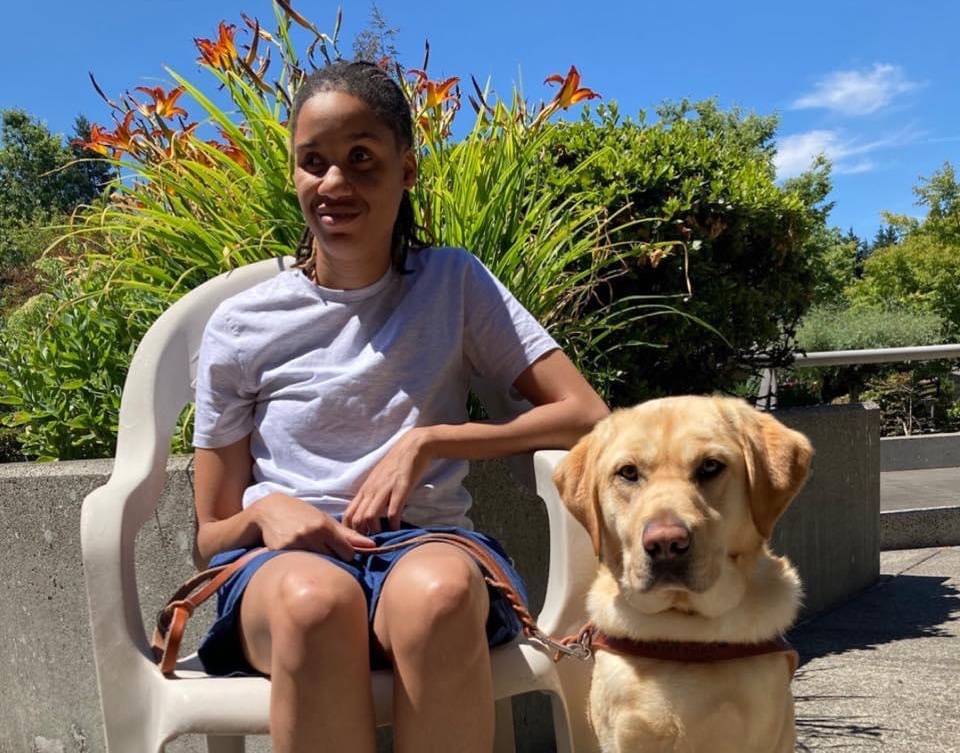
She also cited employment barriers that hinder financial independence for people who are visually impaired. Dickerson travels with her service dog, Kelsa, and believes she has been denied positions because of the dog. Though she is currently employed, Dickerson said she feels “locked out” of other fields.
Her goal is to one day own her own practice and hire an all-blind staff of massage therapists. “I want to pay people equitable wages. We need access to the workforce,” she said.
I could never afford to live on my own, not in this city.
It has been Dickerson’s own village of friends, including others who are visually impaired, who have supported her, more than agencies such as Pennsylvania’s Bureau of Blind and Visual Services (BBVS) — “I got so much pushback from them when I was trying to get funding to go to school for my license.” But friends have supported her in practical ways including money for rent, rides, and even providing space for her private studio in the Feltonville home she shares with four other housemates. “I could never afford to live on my own, not in this city,” she said.
A self-proclaimed activist, Dickerson said she has found that bringing awareness to the challenges blind people face is more effective than fighting with agencies like BBVS to do better.
Take her recent TikTok video of an Uber driver who attempted to deny her service because of Kelsa. Dickerson said she suffered minor injuries when the driver attempted to pull off as she entered the vehicle. Uber offered a small compensation, but more importantly, Dickerson said, “people got to see what happens to a blind person with their dog.”
Dickerson wants to see a shift in attitudes and expectations about people with visual impairments and believes her grassroots activism can have impact. “When you change individual minds, that’s how you can make a larger difference,” she said.
Cory Lloyd: ‘I am light years ahead of where I thought I’d be’
At 23, Cory Lloyd had recently graduated from Rutgers University and was looking forward to finding work in his studied field of communications. But when he started noticing changes in his vision and was diagnosed as having Leber hereditary optic neuropathy, which affects central vision, Lloyd had to adjust his plans.
“The hardest was when I stopped seeing faces and had to stop driving. Not driving was a loss of independence,” Lloyd said. He dealt with depression then and admits “it still sometimes is a struggle.”
“I watched friends get married, have children, advance in their careers and I just felt stuck. I felt like a wing clipped bird that couldn’t fly out the nest,” he said. Plus, “as a communications major, I know how much communication is non-verbal. But now I can’t see things like a smile.”
But he was determined to learn how to live independently as a blind person and for eight months resided at the Colorado Center for the Blind, learning everyday life skills as well as white cane mobility travel, braille, and assistive technology.
Lloyd, now 32, was recently hired as an enrollment coordinator at PA CareerLink, and for the first time in a long time, feels like he is back on a path to succeed.
“I put a lot of pressure on myself so I wouldn’t say I’m thriving yet. But I feel like I’m on my way,” he said. “I think I have the resources to do so.”
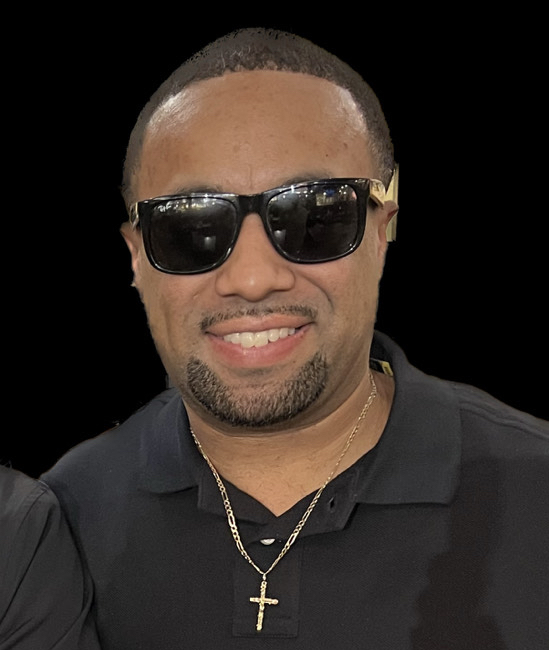
For Lloyd, meaningful employment is a critical first step toward thriving.
“The foundation is employment which leads to financial stability which gives an opportunity to purchase things, go to events, dine out,” he said. “Employment is also attached to identity. When you meet someone, you’re asked what you do. If you don’t have an answer, you lose a bit of your confidence and what is your purpose. Now I have an answer and am more comfortable in social settings.”
Now, with the skills training and a job where he feels fully supported and encouraged by both colleagues and management, Lloyd said he has come a long way.
“Compared to where I was, I am light years ahead of where I thought I’d be. Things that seemed impossible are possible. I’m gradually getting back to feeling like myself,” he said. And instead of feeling like that bird left behind in its nest, Lloyd said at least now, “I’m fluttering. The best is yet to come.”
Stacie Leap: ‘I feel more at peace’
Stacie Leap also experienced vision loss later in life. A brutal assault in 2016 by an ex-boyfriend left her with several serious injuries including a broken neck and total blindness. What’s more, Leap learned she was two months pregnant at the time.
Just prior to the attack, Leap was getting her footing after a period of couch surfing and showering at public gyms. She had gotten a job, her own place and even a car.
“I really thought I was on my way,” Leap said. Yet, “I still had previous trauma and very low self-worth.”
If you had asked her then if she were thriving, she would have answered yes, Leap said; “I thought having those material things meant thriving.” But she believes not dealing with her low self-esteem led her to the abusive relationship.
Now 33 and a single mother of a 6-year-old, Leap is happier, despite vision loss and not having some of those trappings. Initially angry at God for all that happened, Leap said that it was when her daughter turned a year old that she had a revelation: “I just realized how much I was grateful for. She survived with no birth defect, or brain trauma.” Her faith was restored and gave her a new direction.
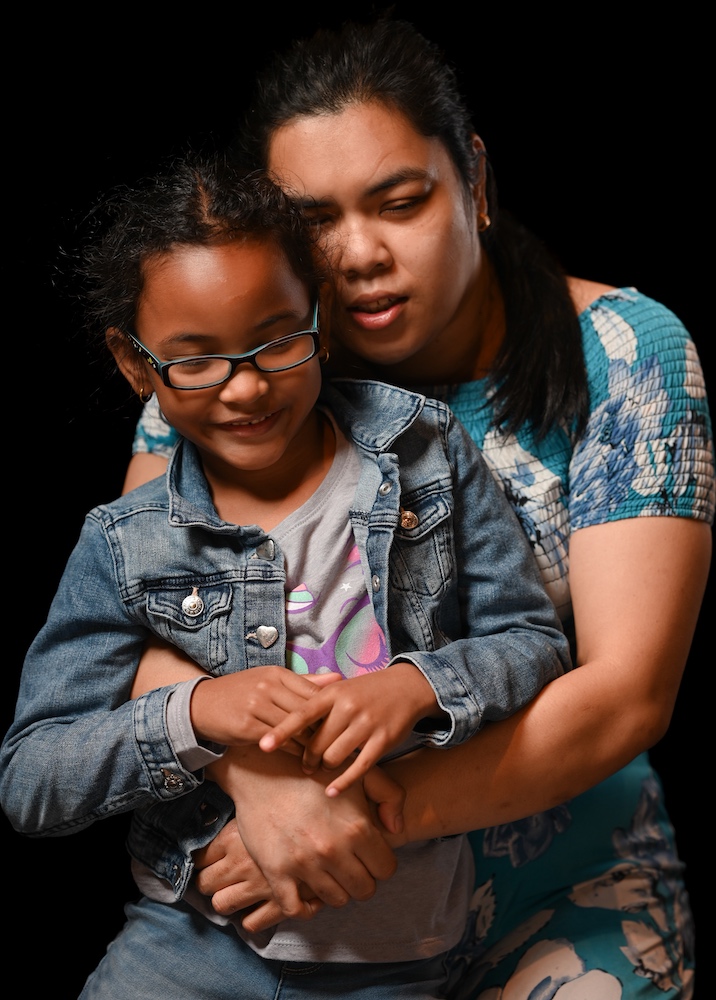
In March 2021, she started a support group for blind parents under the auspices of her local chapter of the National Federation of the Blind (NFB). The monthly virtual meetings are open to anyone and has attracted participants from as far as Canada and California.
“My first two years of motherhood were very hard. I thought I was the only blind person who was also a mother before I found NFB. I want to instill that to tother blind parents,” Leap said. She wants the wider community to know that “blind people can parent just like any other parents. We’re capable. “
Leap works as an accessibility support specialist, testing the accessibility of online programs for screen reader users. She also volunteers with a community peer support group. Her ultimate goal is to complete her college education and start a nonprofit for blind parents.
She agreed with Dickerson that BBVS has been an obstacle to her thriving and reaching her potential. A case was created for her three years ago to help her complete her bachelor’s degree; she is still waiting. She has a much-needed Braille notetaker device but has not received proper training on using it. Her employer has tried to enroll Leap in a program through BBVS that would provide her an additional stipend, yet Leap said efforts to reach the counselor have so far been unsuccessful after several attempts.
Once reticent about her experiences, Leap has been publicly sharing her story in podcast interviews and recently at a City Council meeting honoring Domestic Violence Awareness Month and Blind Equality Achievement Month. She is also featured in “The Write 2 Heal,” an anthology of stories by eight blind women of color who “lost their sight but gained their vision.”
“I feel like I’m thriving now I’m doing something worthwhile,” Leap said. “I feel more at peace.”
Thomas Smith: ‘Thriving is prospering’
At 61, Thomas Smith has lived through a lot of changes in technology that help blind people live independently. And while they may seem a small thing to others, Smith said options like online bill paying and apps that will read mail to you have made a big difference — “I used to have to depend on someone and when they were available to read my mail and it would just pile up.”
Born with congenital glaucoma, Smith had eight operations by the age of 6. The surgeries were somewhat successful until an accident while running caused him to lose all his remaining vision. But Smith is grateful for the education and training he received at Overbrook School for the Blind. He went on to study at both Villanova University and Temple University and worked as a computer programmer for over 20 years.
In 2011, Smith decided to leave the comfort of a steady income and devote himself full-time to his true passion of music. He has been both writing music and performing locally ever since, and again points to how technology has been a game changer.
“Technology has leveled the playing field in my career,” Smith said. He added that many of the programs he uses are also accessible. “With adaptive equipment, I can be just competitive and for a lot less money.”
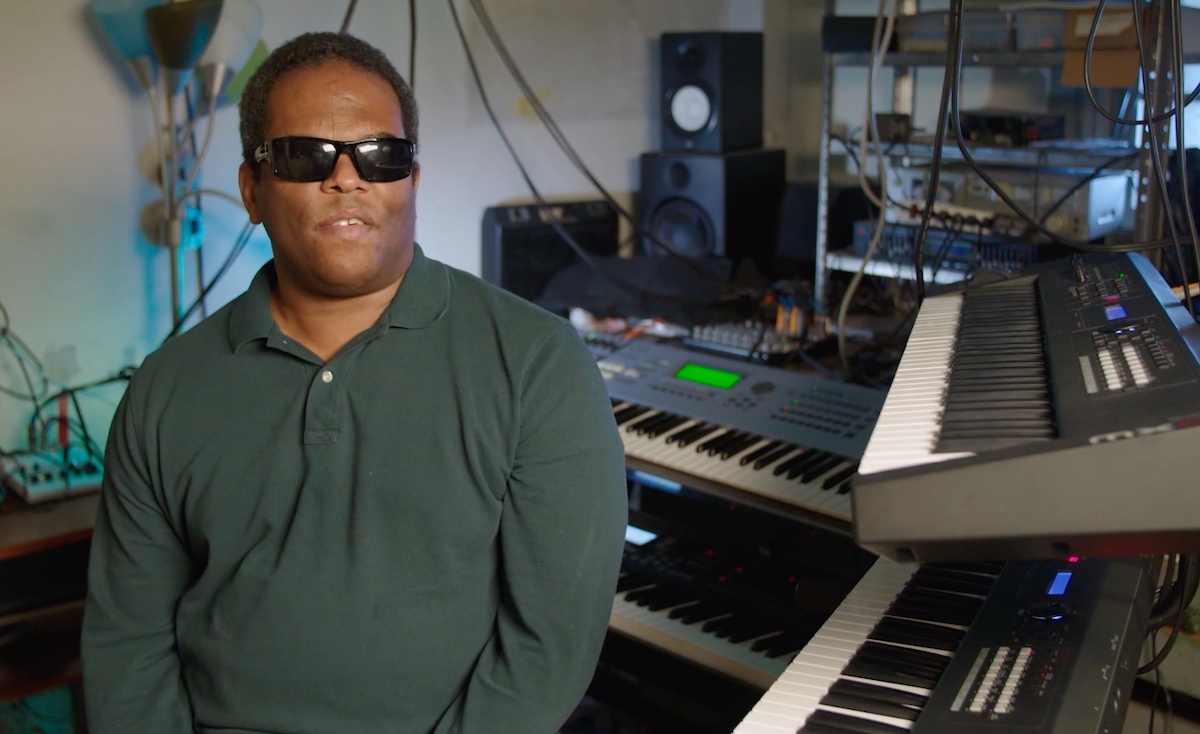
What does thriving mean to him?
“Thriving is prospering,” Smith said, and “making it through life being able to overcome extra obstacles that come from being blind.” Those extra obstacles include simple tasks such as cleaning, cooking, grooming and traveling.
“Being able to navigate your own environment, getting from point A to point B, that’s important to me,“ Smith said. “And I do all of that. I can even hand sew.”
Smith, who said he has lived on his own since age 19, is married and is the father of two adult children who are both sighted, although his wife is also blind. The couple made the decision to parent once they knew the odds were low that their children would be blind. He believes the decision is a personal one, but said “you need to have confidence [to be] a blind parent.”
To Smith, Philadelphia has come a long way in respecting blind people: “Forty years ago, people didn’t really want to help you. There seems now though to be a greater awareness and people aren’t so afraid of you.”
Although he enjoys the freedom of being a freelancing artist, Smith admits that “looking back, that was good money in programming. But I want to prove to myself that I can make a six-figure income writing music.” As for now, Smith said, “I’m able to live on disability, my belly is full, and the lights are on.”

